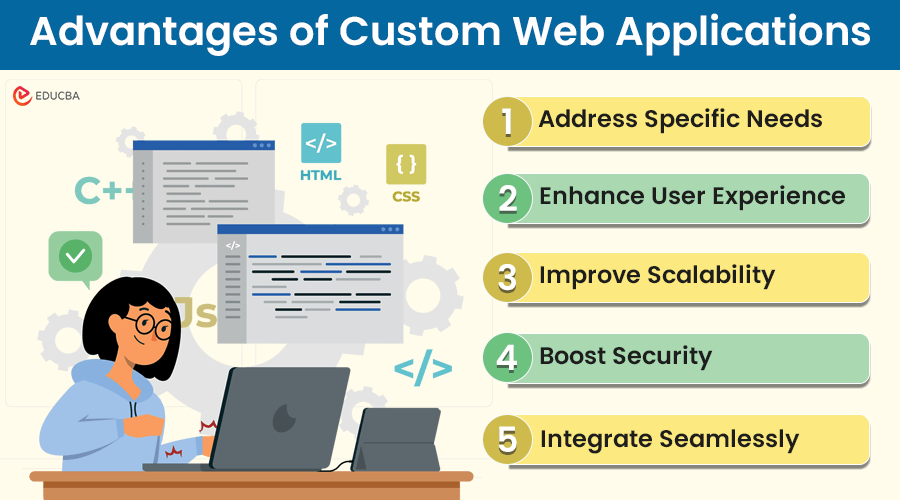
What are Custom Web Applications?
Custom web applications are software designed and developed to satisfy an individual client’s or organization’s specific needs and requirements rather than being a generic, off-the-shelf solution.
Custom web app development can manage business processes, facilitate online transactions, and provide interactive services to users. Moreover, users usually access these applications through a web browser.
This guide explores the benefits of custom web applications, the development process, and how to determine if they are the right fit for your needs.
Advantages of Custom Web Applications
The one-size-fits-all approach to web applications is becoming outdated. Companies now require specific solutions that match their business model, audience, or goals. It is where custom web app development comes in. A Clutch survey found that over 50% of businesses are already using web applications to gain a competitive edge.
This advantage stems from the ability to:
- Address Specific Needs: Generic software often lacks crucial functionalities for your specific business processes. Custom development creates IT solutions tailored to your exact needs.
- Enhance User Experience: A web application that meets your customer base’s requirements can increase user traffic. An improved navigational design makes the site more appealing and easier to use.
- Improve Scalability: Off-the-shelf solutions often struggle to grow with your business. Developers can design custom applications with scalability in mind. This allows you to add new features and functions as needed.
- Boost Security: Generic applications can be vulnerable to security breaches. Custom development lets you prioritize security from the start, protecting sensitive data and reducing risks.
- Integrate Seamlessly: Existing systems and databases are crucial for business operations. Custom web applications can easily interface with these systems, ensuring smooth data transmission and well-coordinated processes.
Custom Web App Development Process
Developing custom web applications is a collaborative process that involves several key stages:
- Discovery and Planning: This initial phase involves understanding the client’s business goals, target audience, and desired functionalities. It includes competitor analysis, outlining user journeys, and defining the project scope.
- Design and Prototyping: UI and UX designers use the collected information to develop layouts and mockups demonstrating how the upcoming application will look and operate.
- Development: The chosen development team translates the design into reality using appropriate programming languages and frameworks tailored to the project’s requirements.
- Testing and Deployment: Thorough testing guarantees that the application works seamlessly across various devices and web browsers. Once testing is complete and satisfactory, the developers deploy the application. It becomes accessible to users at this stage.
- Maintenance and Support: Ongoing maintenance is essential for custom web applications to stay secure, up-to-date, and perform at their best as the client’s business grows and changes.
Key Factors When Selecting a Development Partner
When selecting a development partner:
- Prioritize experience in developing applications relevant to your industry.
- Emphasize clear and transparent communication throughout the development process by ensuring goals and requirements are well understood and conveyed.
- Verify proficiency in the programming languages and frameworks essential for your project.
- Discuss costs openly to establish a clear budget and pricing structure for your custom web application development.
Is Custom Web App Development Right for You?
Although custom web applications offer numerous advantages, they may not suit every situation. Consider the following factors to decide if they are right for your needs:
1. Complexity of Requirements: If your business needs are intricate and go beyond what standard solutions can offer, custom development is likely the most suitable choice.
2. Scalability Requirements: A custom application designed with scalability in mind can prevent the need for expensive upgrades or migrations in the future.
3. Budget: Custom development typically requires a larger upfront investment than off-the-shelf solutions. However, the long-term benefits and return on investment often justify the initial cost.
Final Thoughts
Many organizations find custom web application development services advantageous as they efficiently meet the organization’s specific needs. Custom applications significantly contribute to business growth and success by focusing on improving user experience, bolstering security, and ensuring smooth integration. However, before investing in custom web applications, evaluate the benefits thoughtfully and assess your requirements to see if it is the right choice for you.
Author: Mansoor ul Haq
Meet Mansoor ul Haq, founder of Divijos.co.uk, with over 2 years of experience in SEO, his expertise lies in crafting customized solutions that enhance operational efficiency, improve user experience, and drive business growth.
Recommended Articles
Hope this article was insightful! For related articles on custom web application development and maximizing business potential through tailored solutions, explore further reading on our website.

